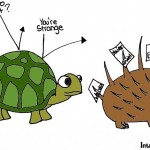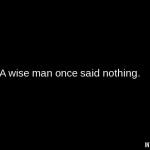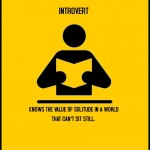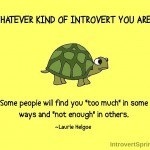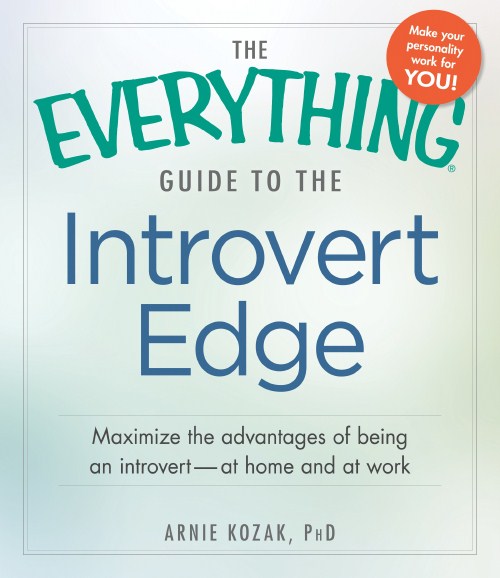
In his new book, The Everything Guide to the Introvert Edge, Arnie Kozak, Ph.D., offers a treasure trove of valuable information about all things introvert. He covers topics ranging from the science behind introversion, to introvert relationships to insights on parenting an introverted child.
*Disclaimer: Three of my illustrations from this blog are featured in The Introvert Edge. Therefore, the narcissistic little gremlin in me will be overjoyed if as many people as possible read this book.
Kozak begins his book by describing some of the chore characteristics of introversion:
“Introverts experience social interactions differently from their extroverted companions. Extroverts are assertive, dominant, gregarious, social and talkers versus introverts who are listeners, thoughtful, prefer small groups to large, prefer writing, and value deep discussion. Introverts will be more drawn to the interior, imagination, and solitude.”
He also makes clear what introversion is not:
“Introversion is not a disease, condition, or deficiency. It is a basic dimension of personality. There is nothing wrong with you if you are an introvert, but like a “stranger in a strange land,” you may feel out of place in a culture that is dedicated to extroversion. Understanding what introversion is and what it is not
is the first step to embracing the Introvert Edge.”
Most importantly, Kozak points out that introverts have something of value to offer the world. Rather than striving to fulfill the extrovert ideal, it is time for introverts and society as a whole to recognize the Introvert Edge. Kozak explains:
“Introverts are no longer in the shadows. They have something to offer in business, education, and society. The notion that introversion is just a lack of extroversion is changing, and an introversion that stands on its own is emerging. The quality of life is not defined by how excited, enthusiastic and ebullient you are. Society is ready to go deeper … to find new riches. These treasures are not as shiny as the stuff found on the surface … The way has opened for a new approach to personality – a new way to be in the world. This is the time to embrace your Introvert Edge.”
Yesterday, I sat down with Arnie for a virtual interview. Here’s what we talked about:
Why do you think there has been so much interest in the topic of introversion lately?
I think people are tired of the hyper-extroversion of the culture. We have collectively become exhausted and chronic stress is one clear indicator that things have been out of balance. Embracing our introvert qualities holds the promise to bring things into better balance.
Why is it important for people to understand introversion?
We are all a mixture of introvert and extrovert, so even if you are an extrovert, understanding introversion is a way to better understand yourself. Extroverts can also treat the introverts in their lives better with this understanding. For introverts, we need to understand introversion so we can take better care of ourselves and not feel bad for who we are. A lack of information can really bind us.
When did you realize you were an introvert and how did this affect your view of yourself?
When I studied Jung’s psychology in college, I’m sure I knew I was an introvert more than an extrovert. As a psychologist, I’ve known about introvert theories for years. But it wasn’t until recently after reading Susan Cain’s Quiet and writing my book that I fully realized the implications of my introversion. It’s been very liberating! I know longer feel bad for not being extroverted enough and I am taking much better care of my introvert needs.
You cover a lot of ground in The Introvert Edge. What are the most interesting things that you learned while writing the book?
The different ways that introverts and extroverts process information was particularly intriguing for me and I am going to delve into this more for my current book project (which will be a mindfulness-based workbook for introverts published by New Harbinger next year). It clarified a lot of situations for me that made perfect sense, like always thinking of something witty to say a few minutes after a situation has passed. That’s classic introvert information processing.
Susan Cain has said that most of her family members were introverts, so family gatherings often centered around reading and thoughtful conversations. What was your upbringing like, and how did this shape your behavior?
My family was nothing like Susan Cain’s family. Large family gatherings were always a mix of excitement and overwhelm. I would always be most comfortable withdrawing to a less hectic corner of the action. I would often walk outside to get away from it all.
If you could offer one piece of advice to your younger introverted self, what would it be?
Celebrate your introversion! It is your greatest gift and also your greatest challenge. We need to learn to embrace who we are and take exquisite care of ourselves at the same time.


